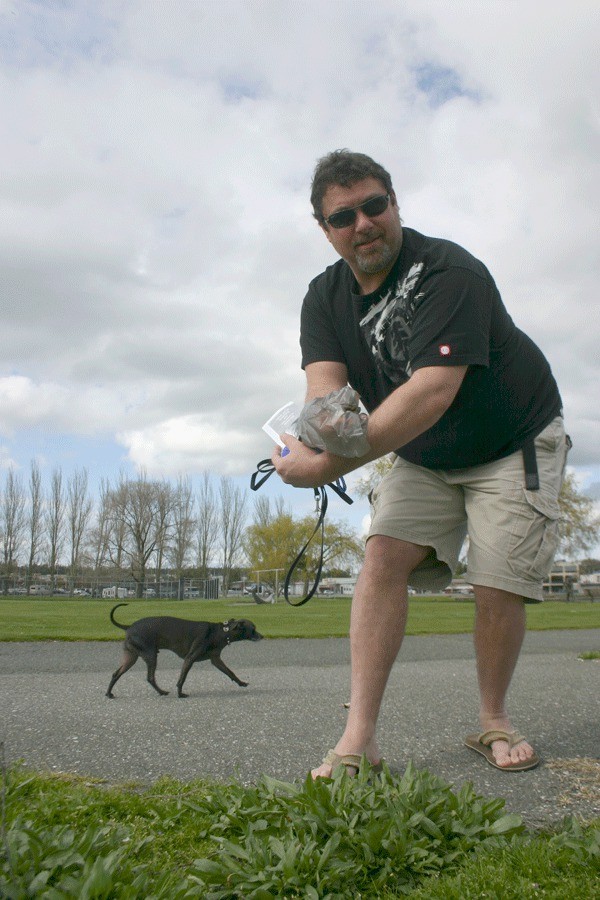The multitude of yellow flags near the Scenic Heights Trail didn’t signify a game of croquet. Instead, it denoted the path of the pet poop patrol as each flag marked a pile of dog waste owners declined to dispose of properly.
Maribeth Crandell, environmental educator for the City of Oak Harbor, invited the Oak Harbor High School Ecology Club to go on pet poop patrol to mark and document the detrimental doo once per month in February, March and April. The group walked down the Scenic Heights Trail and through Windjammer Park to the playground marking and recording waste.
“We’re hoping that with increased awareness and people knowing we’re out here there might be less,” Crandell said. However, the students worry that as summer approaches, more people will bring their dogs out, resulting in more worrisome waste.
Not only are the little surprises unpleasant to step in, but leaving them lying on city park grounds is against city law. Municipal code states that anyone walking a dog in a city park must pick up and properly dispose of the pet waste or face a $250 fine.
Pet poop disposal cans and bags are located at numerous points along the trail and in Windjammer Park. Dog walkers are required to bag the waste and put it in a disposal can.
Crandell tells people to wash their hands immediately or carry hand sanitizer because, according to Island County Public Health, each pea-sized gram of pet waste carries 23 million E.coli bacteria and can also distribute round worms, Giardia and other bacteria or parasites that cause infection in humans.
“This is an educational tool,” Crandell said of the outings. The group couldn’t pick up the piles due to health risks but they could use the information to educate the public. Crandell and the students made signs to put along the trail with information reading, “Pet waste can spread Giardia, round worms, E. coli too,” and a series of signs made by student London Cook that read, “If you leave your dog’s poo, we will find you, pick up the poo, it’ll get on your shoe, it doesn’t smell good and sticks like glue.”
Picking up pet waste isn’t just about keeping your shoes clean. If the waste is left on the ground, rain water will carry the pollutants into ditches and storm pipes that drain into local waters and shellfish filter the fecal bacteria and become unsafe for people to eat, Crandell said.
Ten years ago, pet owners were encouraged to flush waste down the toilet or bury it, but in Island County, drinking water comes from groundwater in aquifers, which can be contaminated by feces, Crandell said.
Pet waste shouldn’t be buried because the harmful bacteria will remain for weeks or years and make pets, their owners and especially children who play in the dirt sick. Pet waste also shouldn’t be flushed down the toilet at risk of harming sewer or septic systems, which are designed to handle human waste only, Crandell said.
Despite braving the wind and the cold over the trio of outings, the students were positive about the experience because it “raises awareness,” Bianca Blake said.
“I feel pretty good about doing good for the park and for the community,” said Kiefer Hermann, another student.
Participating alongside Cook, Blake and Hermann were students John Kaltenbach and Francesco Bernardelli, as well as Oak Harbor High School teacher Lori McKole, leader of the Ecology Club.
When the group first set out in pursuit of poop in February, they found 52 piles along the trail. In March, they counted 50 piles, half of which were in one yard beside the trail at the condominiums at Scenic Heights Trailhead. With a stream next to the yard, this is especially dangerous.
The group flagged 24 piles on their last outing April 18.
“It looks like maybe the effort has helped because we’re finding a lot less today,” Crandell said during the outing.
However, the same yard still contained a large percentage of waste.
“But the ones that aren’t picking it up are the very independent ones who don’t want to make a change just because they’re asked,” Crandell said, adding that those people might change if they knew they could get caught and fined.
Blake said she thinks that when no one’s around, it’s easier for people to just leave the pet waste rather than do the right thing and pick it up.
But the group was on the watch during their outings and approached every dog walker they saw, asking them to display their waste disposal bags. The group also handed out free bag dispensers to dog walkers and informed them of the dangers of a deserted doo. Most of the dog walkers said they always pick up their pet’s waste because it’s the right thing to do, Crandell said. However, none of them mentioned the health or water quality issues, she added.
One dog walker, Remi Chabot, had to prove it on the spot as his little dog stopped while the group was talking to Chabot. Chabot grabbed a bag and bravely bagged the waste as Ecology Club members educated him about disposing of it.
In the past, the Ecology Club has helped Crandell stencil water drains. They also attended the Sound Waters convention and they do the recycling for the high school, among other community- and school-wide efforts.
For more information, call Crandell at 279-4762.



